University Auditing Theory and Practice Report: Case Study Analysis
VerifiedAdded on 2022/10/06
|13
|3245
|19
Report
AI Summary
This report delves into the intricacies of auditing theory and practice, analyzing three case studies to illustrate key concepts. The first case examines Max Security Limited, focusing on inherent risks and materiality in financial reporting, highlighting complexities in the manufacturing industry and the impact of a new costing system. The second case investigates MSMG's debtor confirmation process, identifying weaknesses in verifying account receivables and the potential for material misstatements. The final case explores ethical issues faced by Meg in relation to APES 110, specifically addressing intimidation and self-interest threats, and proposing actions to ensure compliance with ethical standards. The report emphasizes the importance of risk assessment, materiality, and ethical considerations in the auditing process, providing valuable insights into real-world scenarios and best practices. It also highlights potential issues in debtor confirmations and suggests improvements to ensure accurate financial reporting.
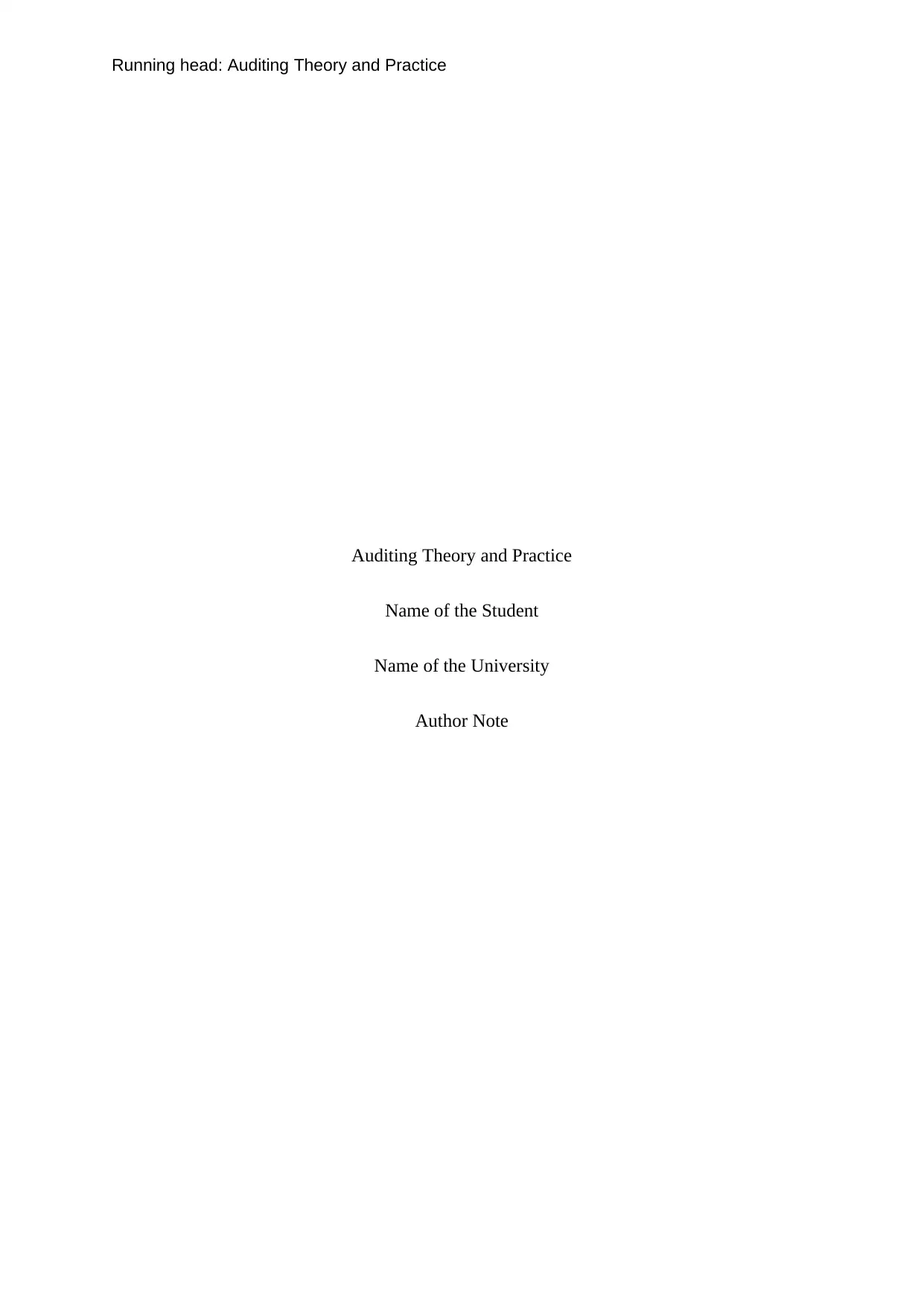
Running head: Auditing Theory and Practice
Auditing Theory and Practice
Name of the Student
Name of the University
Author Note
Auditing Theory and Practice
Name of the Student
Name of the University
Author Note
Paraphrase This Document
Need a fresh take? Get an instant paraphrase of this document with our AI Paraphraser
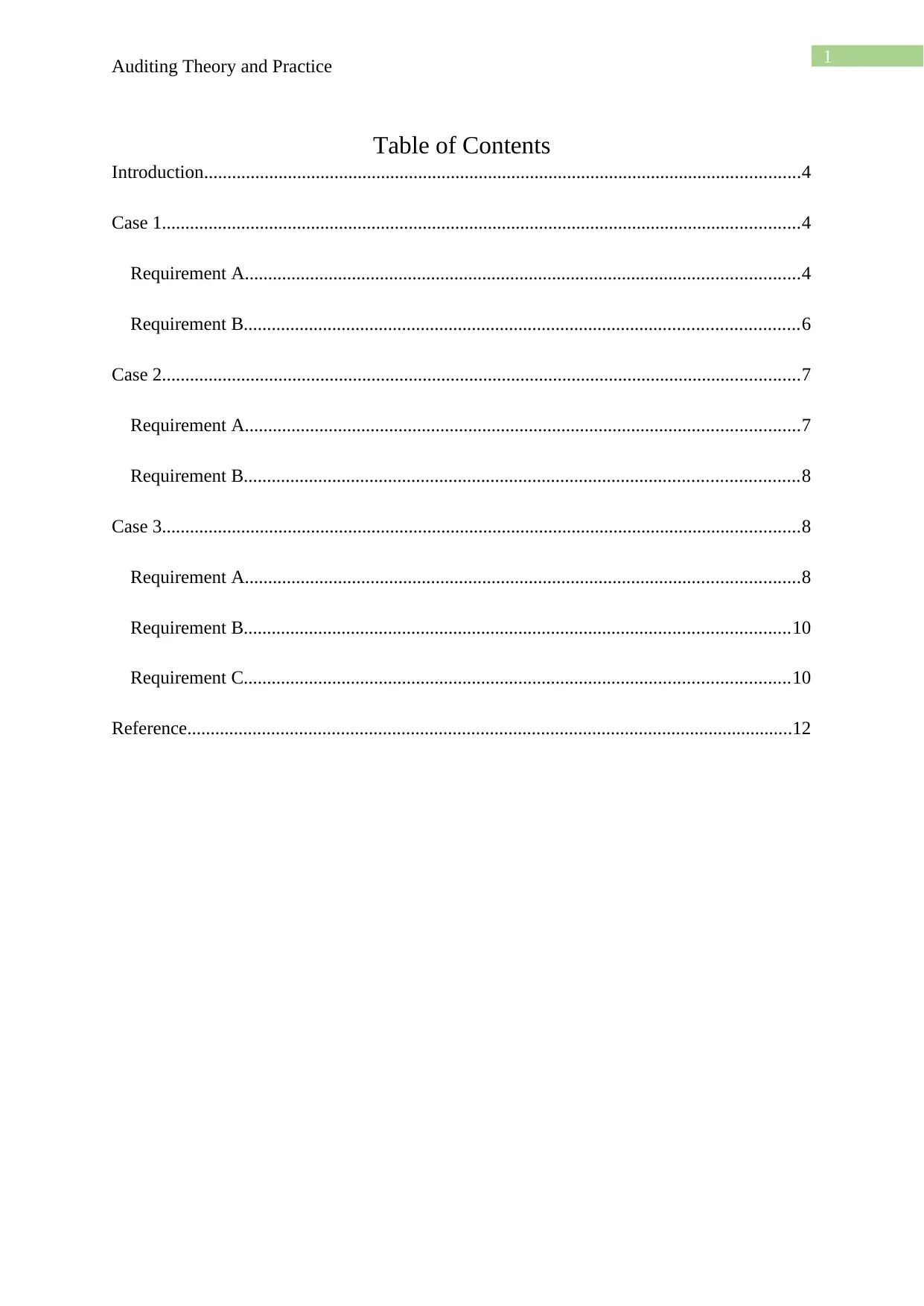
1
Auditing Theory and Practice
Table of Contents
Introduction................................................................................................................................4
Case 1.........................................................................................................................................4
Requirement A.......................................................................................................................4
Requirement B.......................................................................................................................6
Case 2.........................................................................................................................................7
Requirement A.......................................................................................................................7
Requirement B.......................................................................................................................8
Case 3.........................................................................................................................................8
Requirement A.......................................................................................................................8
Requirement B.....................................................................................................................10
Requirement C.....................................................................................................................10
Reference..................................................................................................................................12
Auditing Theory and Practice
Table of Contents
Introduction................................................................................................................................4
Case 1.........................................................................................................................................4
Requirement A.......................................................................................................................4
Requirement B.......................................................................................................................6
Case 2.........................................................................................................................................7
Requirement A.......................................................................................................................7
Requirement B.......................................................................................................................8
Case 3.........................................................................................................................................8
Requirement A.......................................................................................................................8
Requirement B.....................................................................................................................10
Requirement C.....................................................................................................................10
Reference..................................................................................................................................12
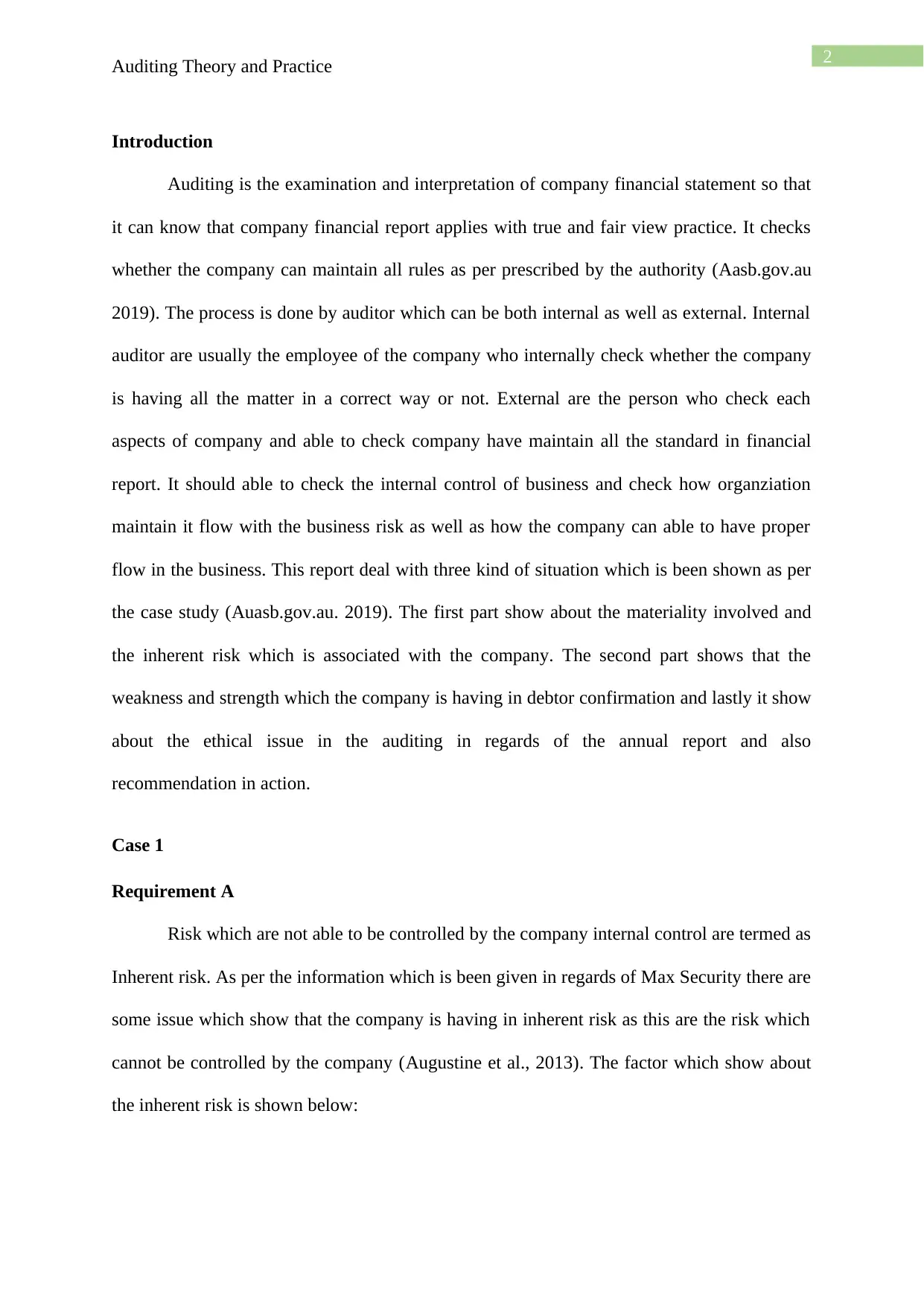
2
Auditing Theory and Practice
Introduction
Auditing is the examination and interpretation of company financial statement so that
it can know that company financial report applies with true and fair view practice. It checks
whether the company can maintain all rules as per prescribed by the authority (Aasb.gov.au
2019). The process is done by auditor which can be both internal as well as external. Internal
auditor are usually the employee of the company who internally check whether the company
is having all the matter in a correct way or not. External are the person who check each
aspects of company and able to check company have maintain all the standard in financial
report. It should able to check the internal control of business and check how organziation
maintain it flow with the business risk as well as how the company can able to have proper
flow in the business. This report deal with three kind of situation which is been shown as per
the case study (Auasb.gov.au. 2019). The first part show about the materiality involved and
the inherent risk which is associated with the company. The second part shows that the
weakness and strength which the company is having in debtor confirmation and lastly it show
about the ethical issue in the auditing in regards of the annual report and also
recommendation in action.
Case 1
Requirement A
Risk which are not able to be controlled by the company internal control are termed as
Inherent risk. As per the information which is been given in regards of Max Security there are
some issue which show that the company is having in inherent risk as this are the risk which
cannot be controlled by the company (Augustine et al., 2013). The factor which show about
the inherent risk is shown below:
Auditing Theory and Practice
Introduction
Auditing is the examination and interpretation of company financial statement so that
it can know that company financial report applies with true and fair view practice. It checks
whether the company can maintain all rules as per prescribed by the authority (Aasb.gov.au
2019). The process is done by auditor which can be both internal as well as external. Internal
auditor are usually the employee of the company who internally check whether the company
is having all the matter in a correct way or not. External are the person who check each
aspects of company and able to check company have maintain all the standard in financial
report. It should able to check the internal control of business and check how organziation
maintain it flow with the business risk as well as how the company can able to have proper
flow in the business. This report deal with three kind of situation which is been shown as per
the case study (Auasb.gov.au. 2019). The first part show about the materiality involved and
the inherent risk which is associated with the company. The second part shows that the
weakness and strength which the company is having in debtor confirmation and lastly it show
about the ethical issue in the auditing in regards of the annual report and also
recommendation in action.
Case 1
Requirement A
Risk which are not able to be controlled by the company internal control are termed as
Inherent risk. As per the information which is been given in regards of Max Security there are
some issue which show that the company is having in inherent risk as this are the risk which
cannot be controlled by the company (Augustine et al., 2013). The factor which show about
the inherent risk is shown below:
⊘ This is a preview!⊘
Do you want full access?
Subscribe today to unlock all pages.

Trusted by 1+ million students worldwide
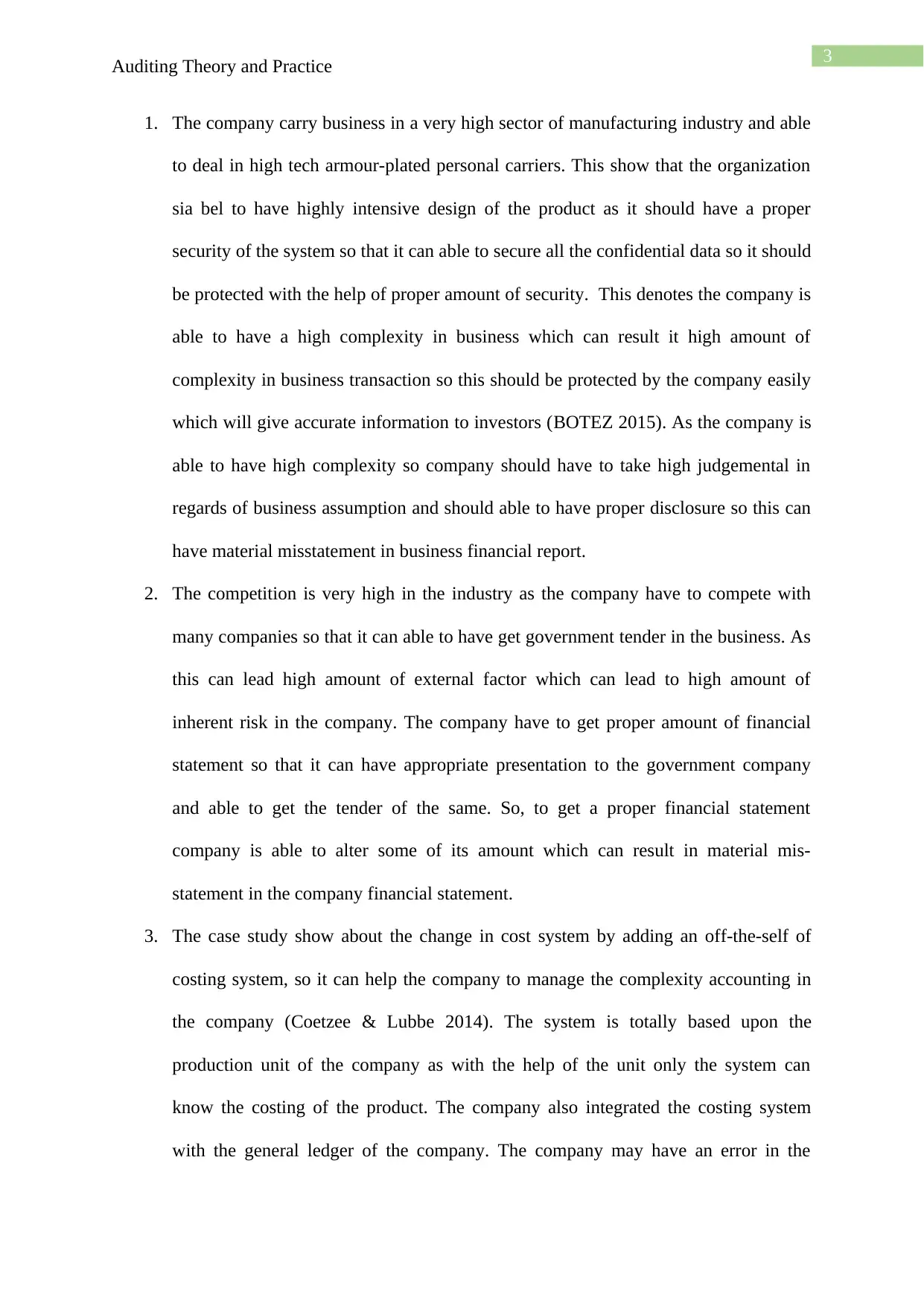
3
Auditing Theory and Practice
1. The company carry business in a very high sector of manufacturing industry and able
to deal in high tech armour-plated personal carriers. This show that the organization
sia bel to have highly intensive design of the product as it should have a proper
security of the system so that it can able to secure all the confidential data so it should
be protected with the help of proper amount of security. This denotes the company is
able to have a high complexity in business which can result it high amount of
complexity in business transaction so this should be protected by the company easily
which will give accurate information to investors (BOTEZ 2015). As the company is
able to have high complexity so company should have to take high judgemental in
regards of business assumption and should able to have proper disclosure so this can
have material misstatement in business financial report.
2. The competition is very high in the industry as the company have to compete with
many companies so that it can able to have get government tender in the business. As
this can lead high amount of external factor which can lead to high amount of
inherent risk in the company. The company have to get proper amount of financial
statement so that it can have appropriate presentation to the government company
and able to get the tender of the same. So, to get a proper financial statement
company is able to alter some of its amount which can result in material mis-
statement in the company financial statement.
3. The case study show about the change in cost system by adding an off-the-self of
costing system, so it can help the company to manage the complexity accounting in
the company (Coetzee & Lubbe 2014). The system is totally based upon the
production unit of the company as with the help of the unit only the system can
know the costing of the product. The company also integrated the costing system
with the general ledger of the company. The company may have an error in the
Auditing Theory and Practice
1. The company carry business in a very high sector of manufacturing industry and able
to deal in high tech armour-plated personal carriers. This show that the organization
sia bel to have highly intensive design of the product as it should have a proper
security of the system so that it can able to secure all the confidential data so it should
be protected with the help of proper amount of security. This denotes the company is
able to have a high complexity in business which can result it high amount of
complexity in business transaction so this should be protected by the company easily
which will give accurate information to investors (BOTEZ 2015). As the company is
able to have high complexity so company should have to take high judgemental in
regards of business assumption and should able to have proper disclosure so this can
have material misstatement in business financial report.
2. The competition is very high in the industry as the company have to compete with
many companies so that it can able to have get government tender in the business. As
this can lead high amount of external factor which can lead to high amount of
inherent risk in the company. The company have to get proper amount of financial
statement so that it can have appropriate presentation to the government company
and able to get the tender of the same. So, to get a proper financial statement
company is able to alter some of its amount which can result in material mis-
statement in the company financial statement.
3. The case study show about the change in cost system by adding an off-the-self of
costing system, so it can help the company to manage the complexity accounting in
the company (Coetzee & Lubbe 2014). The system is totally based upon the
production unit of the company as with the help of the unit only the system can
know the costing of the product. The company also integrated the costing system
with the general ledger of the company. The company may have an error in the
Paraphrase This Document
Need a fresh take? Get an instant paraphrase of this document with our AI Paraphraser
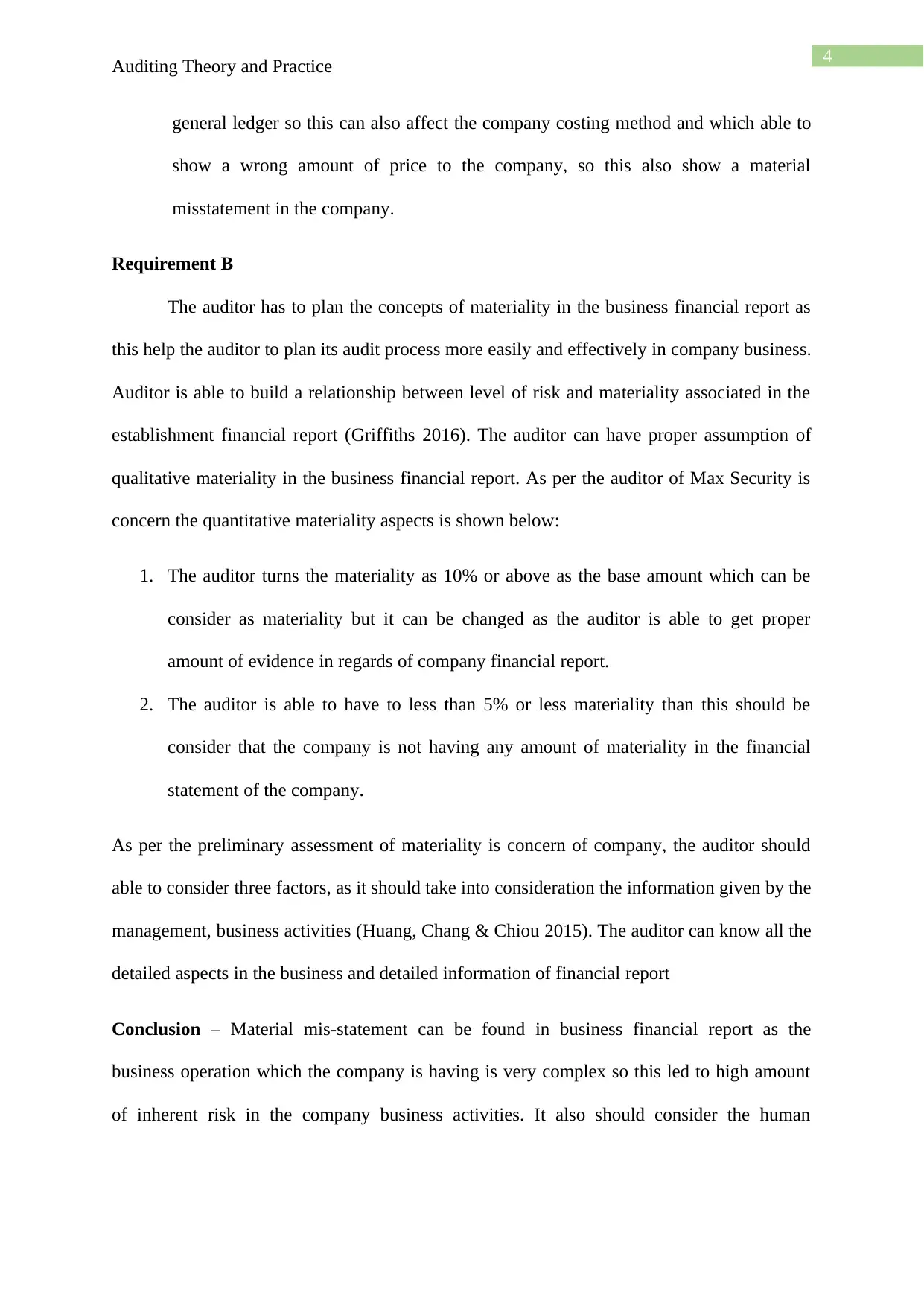
4
Auditing Theory and Practice
general ledger so this can also affect the company costing method and which able to
show a wrong amount of price to the company, so this also show a material
misstatement in the company.
Requirement B
The auditor has to plan the concepts of materiality in the business financial report as
this help the auditor to plan its audit process more easily and effectively in company business.
Auditor is able to build a relationship between level of risk and materiality associated in the
establishment financial report (Griffiths 2016). The auditor can have proper assumption of
qualitative materiality in the business financial report. As per the auditor of Max Security is
concern the quantitative materiality aspects is shown below:
1. The auditor turns the materiality as 10% or above as the base amount which can be
consider as materiality but it can be changed as the auditor is able to get proper
amount of evidence in regards of company financial report.
2. The auditor is able to have to less than 5% or less materiality than this should be
consider that the company is not having any amount of materiality in the financial
statement of the company.
As per the preliminary assessment of materiality is concern of company, the auditor should
able to consider three factors, as it should take into consideration the information given by the
management, business activities (Huang, Chang & Chiou 2015). The auditor can know all the
detailed aspects in the business and detailed information of financial report
Conclusion – Material mis-statement can be found in business financial report as the
business operation which the company is having is very complex so this led to high amount
of inherent risk in the company business activities. It also should consider the human
Auditing Theory and Practice
general ledger so this can also affect the company costing method and which able to
show a wrong amount of price to the company, so this also show a material
misstatement in the company.
Requirement B
The auditor has to plan the concepts of materiality in the business financial report as
this help the auditor to plan its audit process more easily and effectively in company business.
Auditor is able to build a relationship between level of risk and materiality associated in the
establishment financial report (Griffiths 2016). The auditor can have proper assumption of
qualitative materiality in the business financial report. As per the auditor of Max Security is
concern the quantitative materiality aspects is shown below:
1. The auditor turns the materiality as 10% or above as the base amount which can be
consider as materiality but it can be changed as the auditor is able to get proper
amount of evidence in regards of company financial report.
2. The auditor is able to have to less than 5% or less materiality than this should be
consider that the company is not having any amount of materiality in the financial
statement of the company.
As per the preliminary assessment of materiality is concern of company, the auditor should
able to consider three factors, as it should take into consideration the information given by the
management, business activities (Huang, Chang & Chiou 2015). The auditor can know all the
detailed aspects in the business and detailed information of financial report
Conclusion – Material mis-statement can be found in business financial report as the
business operation which the company is having is very complex so this led to high amount
of inherent risk in the company business activities. It also should consider the human
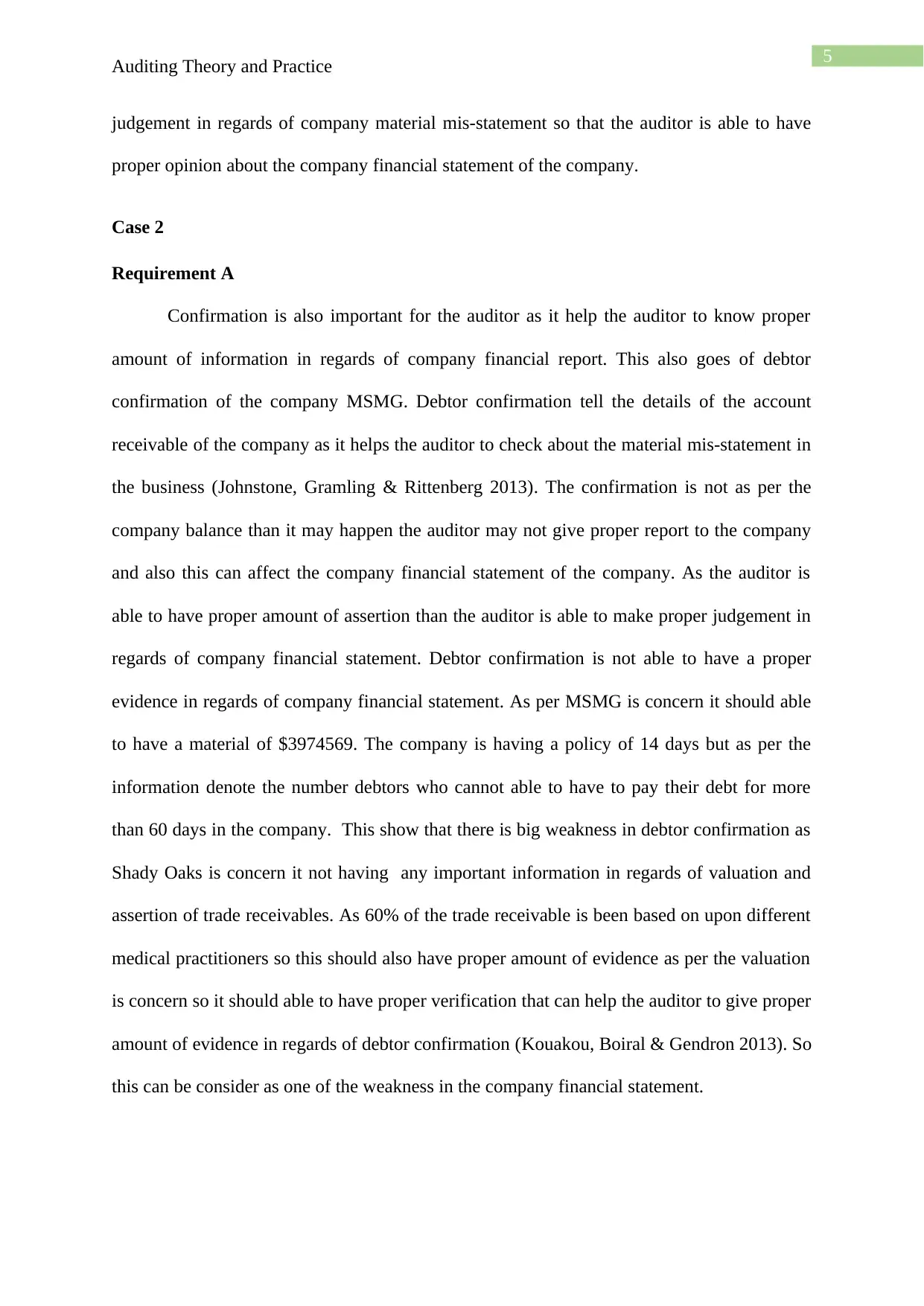
5
Auditing Theory and Practice
judgement in regards of company material mis-statement so that the auditor is able to have
proper opinion about the company financial statement of the company.
Case 2
Requirement A
Confirmation is also important for the auditor as it help the auditor to know proper
amount of information in regards of company financial report. This also goes of debtor
confirmation of the company MSMG. Debtor confirmation tell the details of the account
receivable of the company as it helps the auditor to check about the material mis-statement in
the business (Johnstone, Gramling & Rittenberg 2013). The confirmation is not as per the
company balance than it may happen the auditor may not give proper report to the company
and also this can affect the company financial statement of the company. As the auditor is
able to have proper amount of assertion than the auditor is able to make proper judgement in
regards of company financial statement. Debtor confirmation is not able to have a proper
evidence in regards of company financial statement. As per MSMG is concern it should able
to have a material of $3974569. The company is having a policy of 14 days but as per the
information denote the number debtors who cannot able to have to pay their debt for more
than 60 days in the company. This show that there is big weakness in debtor confirmation as
Shady Oaks is concern it not having any important information in regards of valuation and
assertion of trade receivables. As 60% of the trade receivable is been based on upon different
medical practitioners so this should also have proper amount of evidence as per the valuation
is concern so it should able to have proper verification that can help the auditor to give proper
amount of evidence in regards of debtor confirmation (Kouakou, Boiral & Gendron 2013). So
this can be consider as one of the weakness in the company financial statement.
Auditing Theory and Practice
judgement in regards of company material mis-statement so that the auditor is able to have
proper opinion about the company financial statement of the company.
Case 2
Requirement A
Confirmation is also important for the auditor as it help the auditor to know proper
amount of information in regards of company financial report. This also goes of debtor
confirmation of the company MSMG. Debtor confirmation tell the details of the account
receivable of the company as it helps the auditor to check about the material mis-statement in
the business (Johnstone, Gramling & Rittenberg 2013). The confirmation is not as per the
company balance than it may happen the auditor may not give proper report to the company
and also this can affect the company financial statement of the company. As the auditor is
able to have proper amount of assertion than the auditor is able to make proper judgement in
regards of company financial statement. Debtor confirmation is not able to have a proper
evidence in regards of company financial statement. As per MSMG is concern it should able
to have a material of $3974569. The company is having a policy of 14 days but as per the
information denote the number debtors who cannot able to have to pay their debt for more
than 60 days in the company. This show that there is big weakness in debtor confirmation as
Shady Oaks is concern it not having any important information in regards of valuation and
assertion of trade receivables. As 60% of the trade receivable is been based on upon different
medical practitioners so this should also have proper amount of evidence as per the valuation
is concern so it should able to have proper verification that can help the auditor to give proper
amount of evidence in regards of debtor confirmation (Kouakou, Boiral & Gendron 2013). So
this can be consider as one of the weakness in the company financial statement.
⊘ This is a preview!⊘
Do you want full access?
Subscribe today to unlock all pages.

Trusted by 1+ million students worldwide
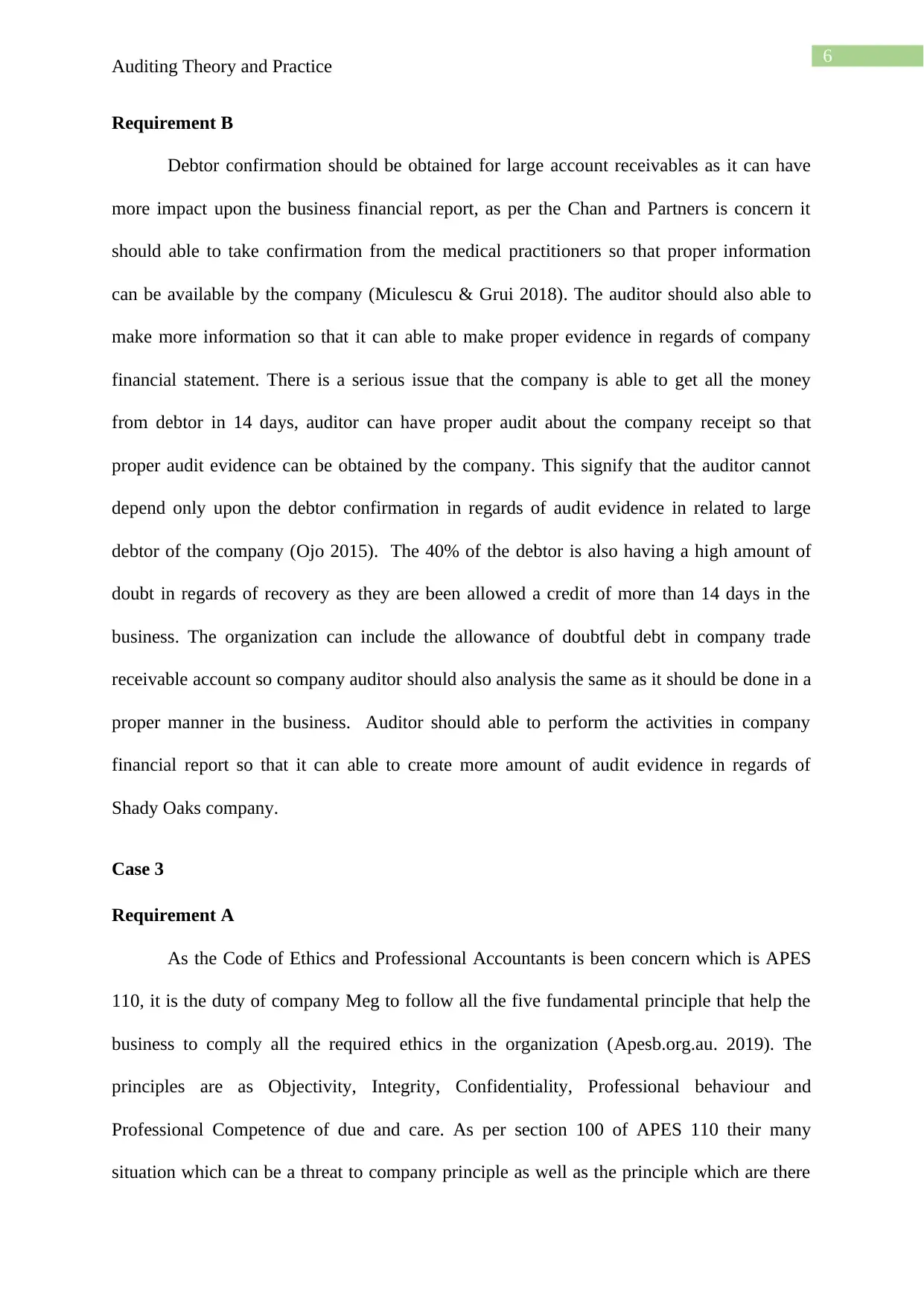
6
Auditing Theory and Practice
Requirement B
Debtor confirmation should be obtained for large account receivables as it can have
more impact upon the business financial report, as per the Chan and Partners is concern it
should able to take confirmation from the medical practitioners so that proper information
can be available by the company (Miculescu & Grui 2018). The auditor should also able to
make more information so that it can able to make proper evidence in regards of company
financial statement. There is a serious issue that the company is able to get all the money
from debtor in 14 days, auditor can have proper audit about the company receipt so that
proper audit evidence can be obtained by the company. This signify that the auditor cannot
depend only upon the debtor confirmation in regards of audit evidence in related to large
debtor of the company (Ojo 2015). The 40% of the debtor is also having a high amount of
doubt in regards of recovery as they are been allowed a credit of more than 14 days in the
business. The organization can include the allowance of doubtful debt in company trade
receivable account so company auditor should also analysis the same as it should be done in a
proper manner in the business. Auditor should able to perform the activities in company
financial report so that it can able to create more amount of audit evidence in regards of
Shady Oaks company.
Case 3
Requirement A
As the Code of Ethics and Professional Accountants is been concern which is APES
110, it is the duty of company Meg to follow all the five fundamental principle that help the
business to comply all the required ethics in the organization (Apesb.org.au. 2019). The
principles are as Objectivity, Integrity, Confidentiality, Professional behaviour and
Professional Competence of due and care. As per section 100 of APES 110 their many
situation which can be a threat to company principle as well as the principle which are there
Auditing Theory and Practice
Requirement B
Debtor confirmation should be obtained for large account receivables as it can have
more impact upon the business financial report, as per the Chan and Partners is concern it
should able to take confirmation from the medical practitioners so that proper information
can be available by the company (Miculescu & Grui 2018). The auditor should also able to
make more information so that it can able to make proper evidence in regards of company
financial statement. There is a serious issue that the company is able to get all the money
from debtor in 14 days, auditor can have proper audit about the company receipt so that
proper audit evidence can be obtained by the company. This signify that the auditor cannot
depend only upon the debtor confirmation in regards of audit evidence in related to large
debtor of the company (Ojo 2015). The 40% of the debtor is also having a high amount of
doubt in regards of recovery as they are been allowed a credit of more than 14 days in the
business. The organization can include the allowance of doubtful debt in company trade
receivable account so company auditor should also analysis the same as it should be done in a
proper manner in the business. Auditor should able to perform the activities in company
financial report so that it can able to create more amount of audit evidence in regards of
Shady Oaks company.
Case 3
Requirement A
As the Code of Ethics and Professional Accountants is been concern which is APES
110, it is the duty of company Meg to follow all the five fundamental principle that help the
business to comply all the required ethics in the organization (Apesb.org.au. 2019). The
principles are as Objectivity, Integrity, Confidentiality, Professional behaviour and
Professional Competence of due and care. As per section 100 of APES 110 their many
situation which can be a threat to company principle as well as the principle which are there
Paraphrase This Document
Need a fresh take? Get an instant paraphrase of this document with our AI Paraphraser
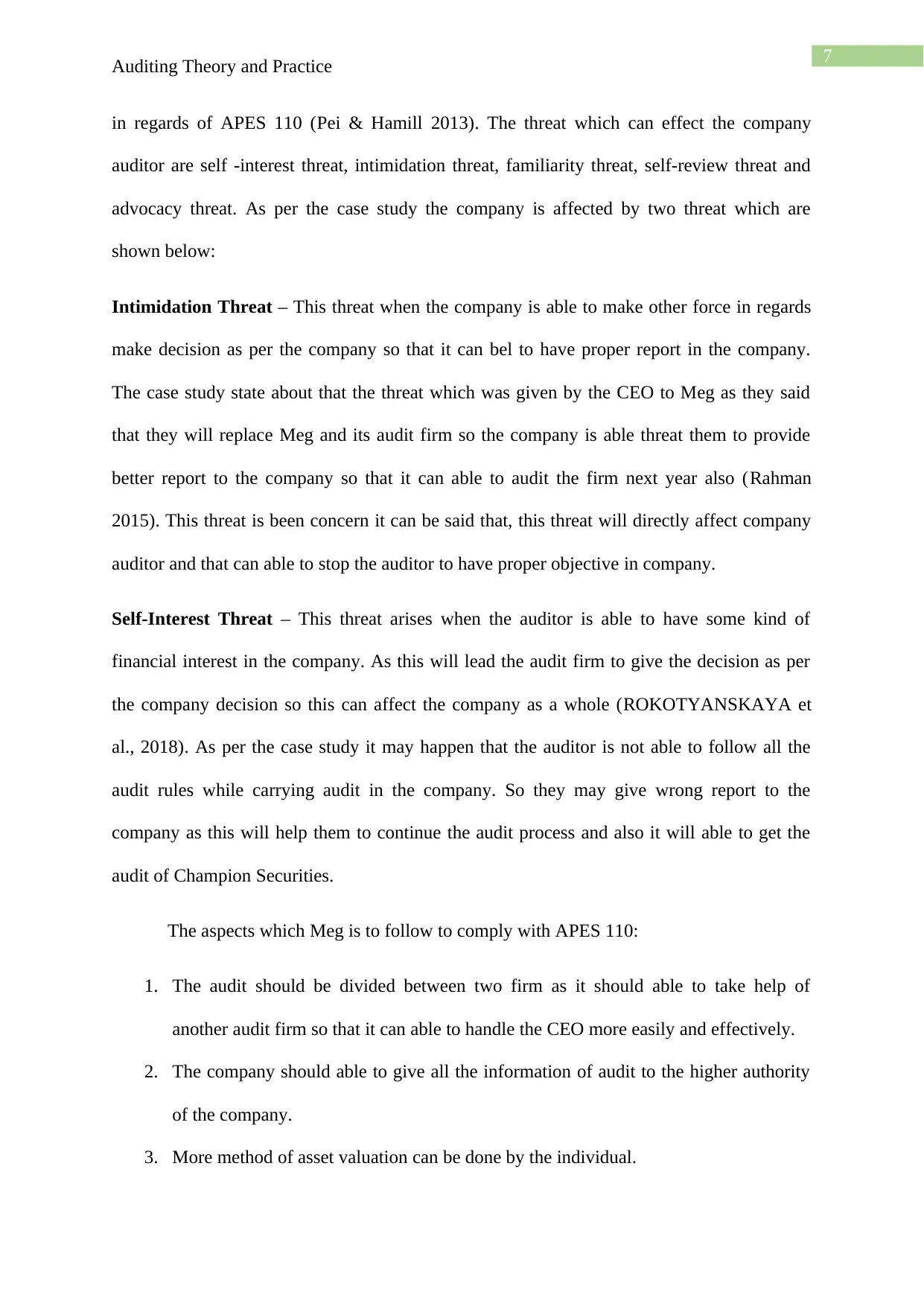
7
Auditing Theory and Practice
in regards of APES 110 (Pei & Hamill 2013). The threat which can effect the company
auditor are self -interest threat, intimidation threat, familiarity threat, self-review threat and
advocacy threat. As per the case study the company is affected by two threat which are
shown below:
Intimidation Threat – This threat when the company is able to make other force in regards
make decision as per the company so that it can bel to have proper report in the company.
The case study state about that the threat which was given by the CEO to Meg as they said
that they will replace Meg and its audit firm so the company is able threat them to provide
better report to the company so that it can able to audit the firm next year also (Rahman
2015). This threat is been concern it can be said that, this threat will directly affect company
auditor and that can able to stop the auditor to have proper objective in company.
Self-Interest Threat – This threat arises when the auditor is able to have some kind of
financial interest in the company. As this will lead the audit firm to give the decision as per
the company decision so this can affect the company as a whole (ROKOTYANSKAYA et
al., 2018). As per the case study it may happen that the auditor is not able to follow all the
audit rules while carrying audit in the company. So they may give wrong report to the
company as this will help them to continue the audit process and also it will able to get the
audit of Champion Securities.
The aspects which Meg is to follow to comply with APES 110:
1. The audit should be divided between two firm as it should able to take help of
another audit firm so that it can able to handle the CEO more easily and effectively.
2. The company should able to give all the information of audit to the higher authority
of the company.
3. More method of asset valuation can be done by the individual.
Auditing Theory and Practice
in regards of APES 110 (Pei & Hamill 2013). The threat which can effect the company
auditor are self -interest threat, intimidation threat, familiarity threat, self-review threat and
advocacy threat. As per the case study the company is affected by two threat which are
shown below:
Intimidation Threat – This threat when the company is able to make other force in regards
make decision as per the company so that it can bel to have proper report in the company.
The case study state about that the threat which was given by the CEO to Meg as they said
that they will replace Meg and its audit firm so the company is able threat them to provide
better report to the company so that it can able to audit the firm next year also (Rahman
2015). This threat is been concern it can be said that, this threat will directly affect company
auditor and that can able to stop the auditor to have proper objective in company.
Self-Interest Threat – This threat arises when the auditor is able to have some kind of
financial interest in the company. As this will lead the audit firm to give the decision as per
the company decision so this can affect the company as a whole (ROKOTYANSKAYA et
al., 2018). As per the case study it may happen that the auditor is not able to follow all the
audit rules while carrying audit in the company. So they may give wrong report to the
company as this will help them to continue the audit process and also it will able to get the
audit of Champion Securities.
The aspects which Meg is to follow to comply with APES 110:
1. The audit should be divided between two firm as it should able to take help of
another audit firm so that it can able to handle the CEO more easily and effectively.
2. The company should able to give all the information of audit to the higher authority
of the company.
3. More method of asset valuation can be done by the individual.
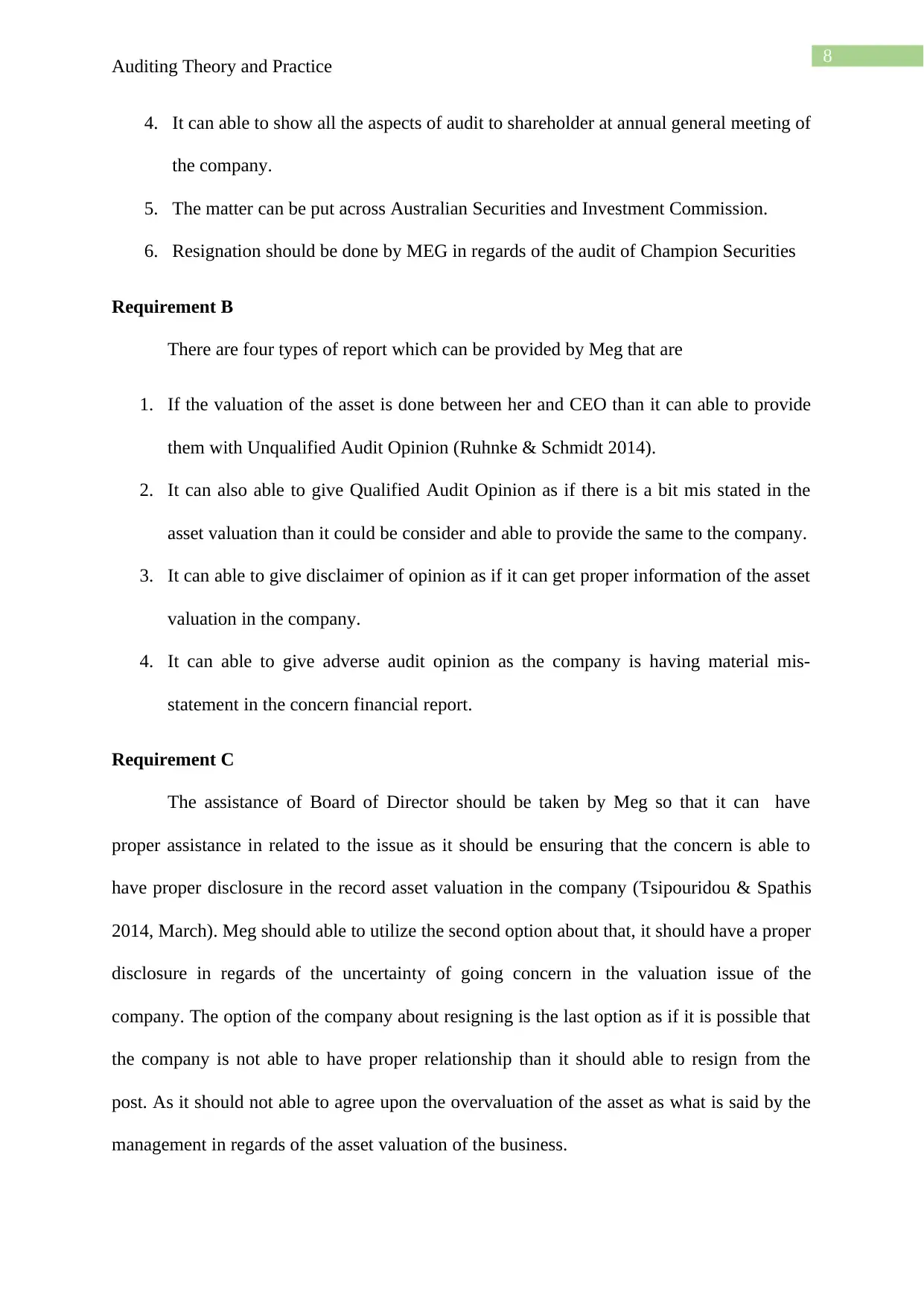
8
Auditing Theory and Practice
4. It can able to show all the aspects of audit to shareholder at annual general meeting of
the company.
5. The matter can be put across Australian Securities and Investment Commission.
6. Resignation should be done by MEG in regards of the audit of Champion Securities
Requirement B
There are four types of report which can be provided by Meg that are
1. If the valuation of the asset is done between her and CEO than it can able to provide
them with Unqualified Audit Opinion (Ruhnke & Schmidt 2014).
2. It can also able to give Qualified Audit Opinion as if there is a bit mis stated in the
asset valuation than it could be consider and able to provide the same to the company.
3. It can able to give disclaimer of opinion as if it can get proper information of the asset
valuation in the company.
4. It can able to give adverse audit opinion as the company is having material mis-
statement in the concern financial report.
Requirement C
The assistance of Board of Director should be taken by Meg so that it can have
proper assistance in related to the issue as it should be ensuring that the concern is able to
have proper disclosure in the record asset valuation in the company (Tsipouridou & Spathis
2014, March). Meg should able to utilize the second option about that, it should have a proper
disclosure in regards of the uncertainty of going concern in the valuation issue of the
company. The option of the company about resigning is the last option as if it is possible that
the company is not able to have proper relationship than it should able to resign from the
post. As it should not able to agree upon the overvaluation of the asset as what is said by the
management in regards of the asset valuation of the business.
Auditing Theory and Practice
4. It can able to show all the aspects of audit to shareholder at annual general meeting of
the company.
5. The matter can be put across Australian Securities and Investment Commission.
6. Resignation should be done by MEG in regards of the audit of Champion Securities
Requirement B
There are four types of report which can be provided by Meg that are
1. If the valuation of the asset is done between her and CEO than it can able to provide
them with Unqualified Audit Opinion (Ruhnke & Schmidt 2014).
2. It can also able to give Qualified Audit Opinion as if there is a bit mis stated in the
asset valuation than it could be consider and able to provide the same to the company.
3. It can able to give disclaimer of opinion as if it can get proper information of the asset
valuation in the company.
4. It can able to give adverse audit opinion as the company is having material mis-
statement in the concern financial report.
Requirement C
The assistance of Board of Director should be taken by Meg so that it can have
proper assistance in related to the issue as it should be ensuring that the concern is able to
have proper disclosure in the record asset valuation in the company (Tsipouridou & Spathis
2014, March). Meg should able to utilize the second option about that, it should have a proper
disclosure in regards of the uncertainty of going concern in the valuation issue of the
company. The option of the company about resigning is the last option as if it is possible that
the company is not able to have proper relationship than it should able to resign from the
post. As it should not able to agree upon the overvaluation of the asset as what is said by the
management in regards of the asset valuation of the business.
⊘ This is a preview!⊘
Do you want full access?
Subscribe today to unlock all pages.

Trusted by 1+ million students worldwide
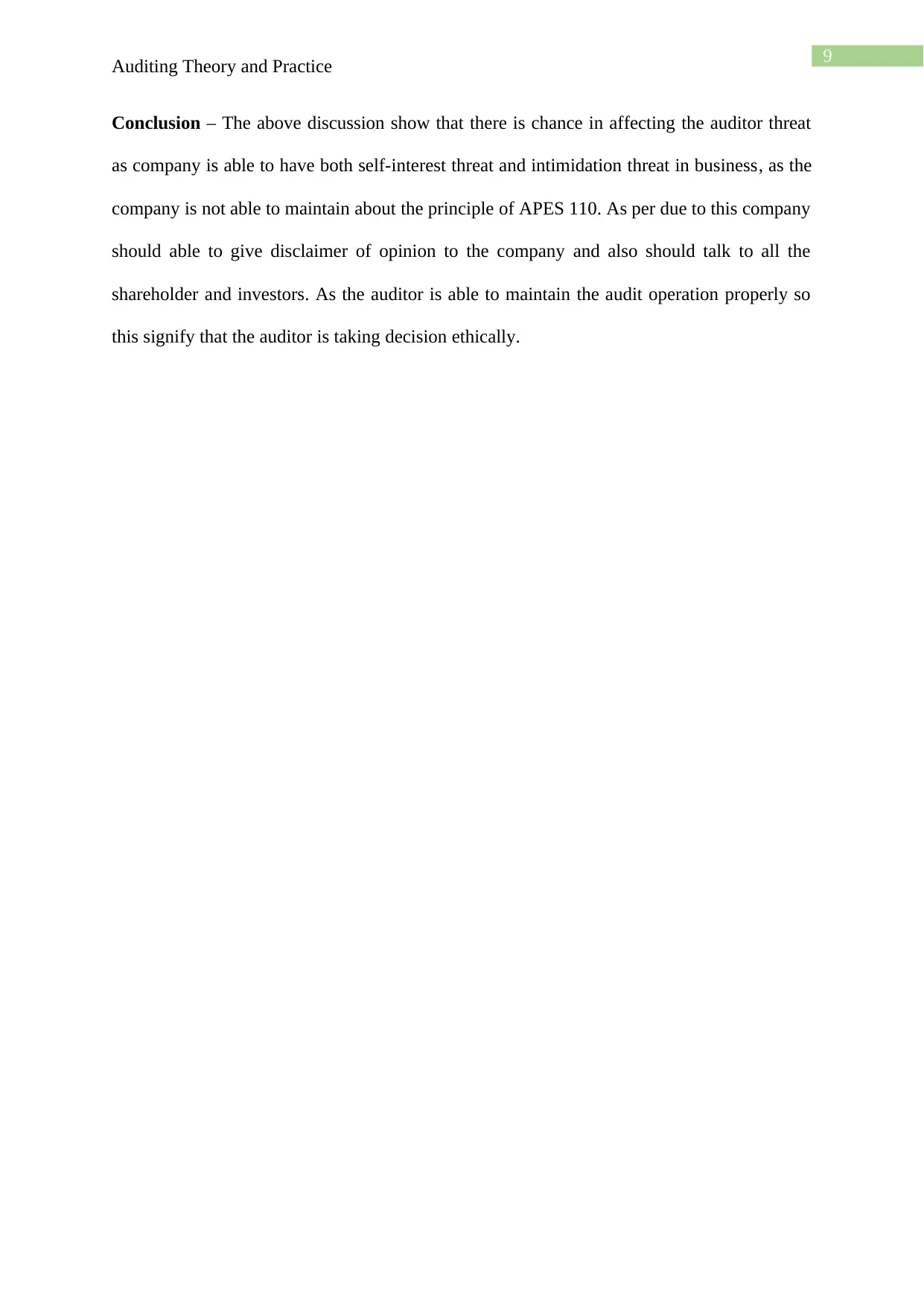
9
Auditing Theory and Practice
Conclusion – The above discussion show that there is chance in affecting the auditor threat
as company is able to have both self-interest threat and intimidation threat in business, as the
company is not able to maintain about the principle of APES 110. As per due to this company
should able to give disclaimer of opinion to the company and also should talk to all the
shareholder and investors. As the auditor is able to maintain the audit operation properly so
this signify that the auditor is taking decision ethically.
Auditing Theory and Practice
Conclusion – The above discussion show that there is chance in affecting the auditor threat
as company is able to have both self-interest threat and intimidation threat in business, as the
company is not able to maintain about the principle of APES 110. As per due to this company
should able to give disclaimer of opinion to the company and also should talk to all the
shareholder and investors. As the auditor is able to maintain the audit operation properly so
this signify that the auditor is taking decision ethically.
Paraphrase This Document
Need a fresh take? Get an instant paraphrase of this document with our AI Paraphraser
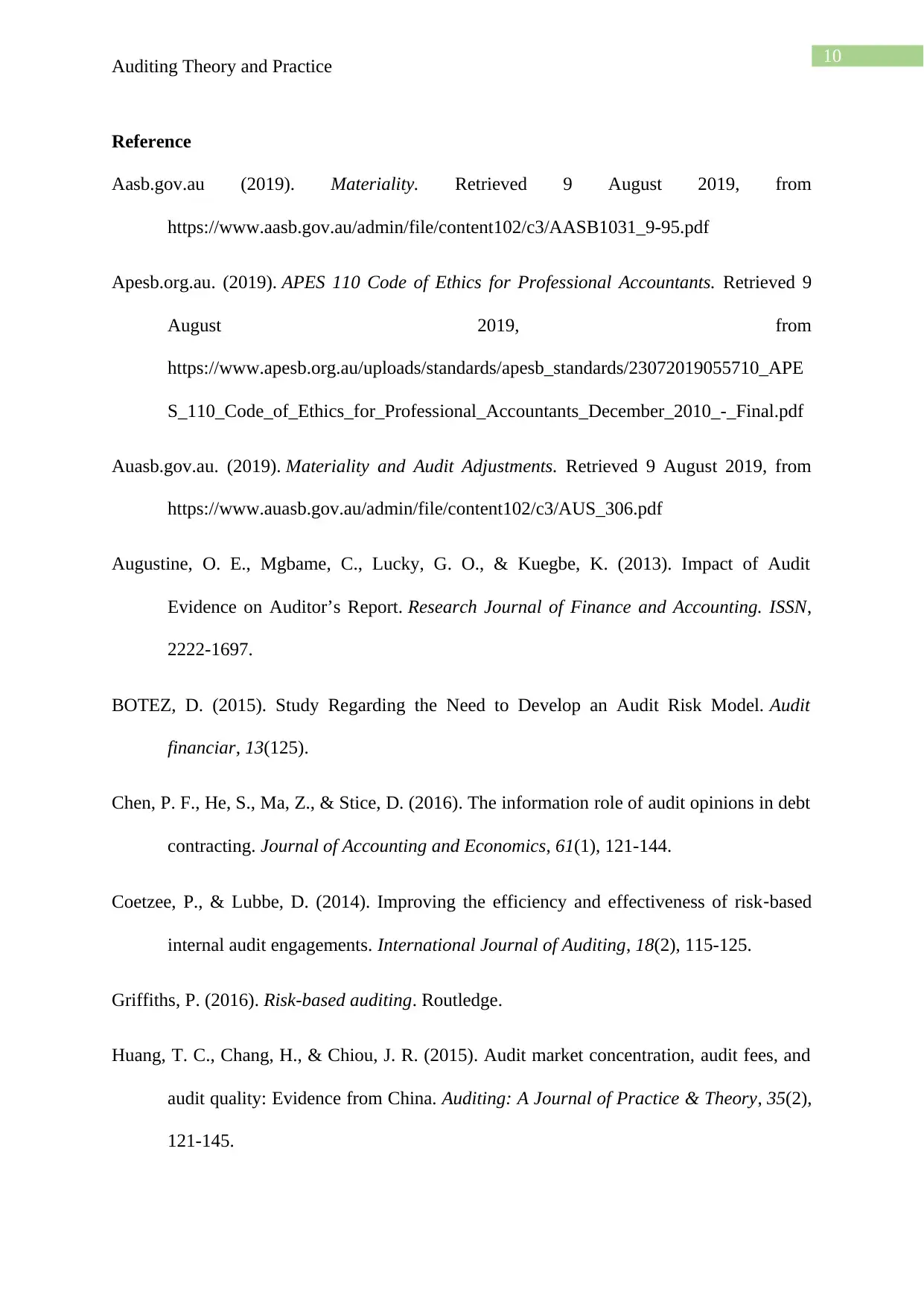
10
Auditing Theory and Practice
Reference
Aasb.gov.au (2019). Materiality. Retrieved 9 August 2019, from
https://www.aasb.gov.au/admin/file/content102/c3/AASB1031_9-95.pdf
Apesb.org.au. (2019). APES 110 Code of Ethics for Professional Accountants. Retrieved 9
August 2019, from
https://www.apesb.org.au/uploads/standards/apesb_standards/23072019055710_APE
S_110_Code_of_Ethics_for_Professional_Accountants_December_2010_-_Final.pdf
Auasb.gov.au. (2019). Materiality and Audit Adjustments. Retrieved 9 August 2019, from
https://www.auasb.gov.au/admin/file/content102/c3/AUS_306.pdf
Augustine, O. E., Mgbame, C., Lucky, G. O., & Kuegbe, K. (2013). Impact of Audit
Evidence on Auditor’s Report. Research Journal of Finance and Accounting. ISSN,
2222-1697.
BOTEZ, D. (2015). Study Regarding the Need to Develop an Audit Risk Model. Audit
financiar, 13(125).
Chen, P. F., He, S., Ma, Z., & Stice, D. (2016). The information role of audit opinions in debt
contracting. Journal of Accounting and Economics, 61(1), 121-144.
Coetzee, P., & Lubbe, D. (2014). Improving the efficiency and effectiveness of risk‐based
internal audit engagements. International Journal of Auditing, 18(2), 115-125.
Griffiths, P. (2016). Risk-based auditing. Routledge.
Huang, T. C., Chang, H., & Chiou, J. R. (2015). Audit market concentration, audit fees, and
audit quality: Evidence from China. Auditing: A Journal of Practice & Theory, 35(2),
121-145.
Auditing Theory and Practice
Reference
Aasb.gov.au (2019). Materiality. Retrieved 9 August 2019, from
https://www.aasb.gov.au/admin/file/content102/c3/AASB1031_9-95.pdf
Apesb.org.au. (2019). APES 110 Code of Ethics for Professional Accountants. Retrieved 9
August 2019, from
https://www.apesb.org.au/uploads/standards/apesb_standards/23072019055710_APE
S_110_Code_of_Ethics_for_Professional_Accountants_December_2010_-_Final.pdf
Auasb.gov.au. (2019). Materiality and Audit Adjustments. Retrieved 9 August 2019, from
https://www.auasb.gov.au/admin/file/content102/c3/AUS_306.pdf
Augustine, O. E., Mgbame, C., Lucky, G. O., & Kuegbe, K. (2013). Impact of Audit
Evidence on Auditor’s Report. Research Journal of Finance and Accounting. ISSN,
2222-1697.
BOTEZ, D. (2015). Study Regarding the Need to Develop an Audit Risk Model. Audit
financiar, 13(125).
Chen, P. F., He, S., Ma, Z., & Stice, D. (2016). The information role of audit opinions in debt
contracting. Journal of Accounting and Economics, 61(1), 121-144.
Coetzee, P., & Lubbe, D. (2014). Improving the efficiency and effectiveness of risk‐based
internal audit engagements. International Journal of Auditing, 18(2), 115-125.
Griffiths, P. (2016). Risk-based auditing. Routledge.
Huang, T. C., Chang, H., & Chiou, J. R. (2015). Audit market concentration, audit fees, and
audit quality: Evidence from China. Auditing: A Journal of Practice & Theory, 35(2),
121-145.
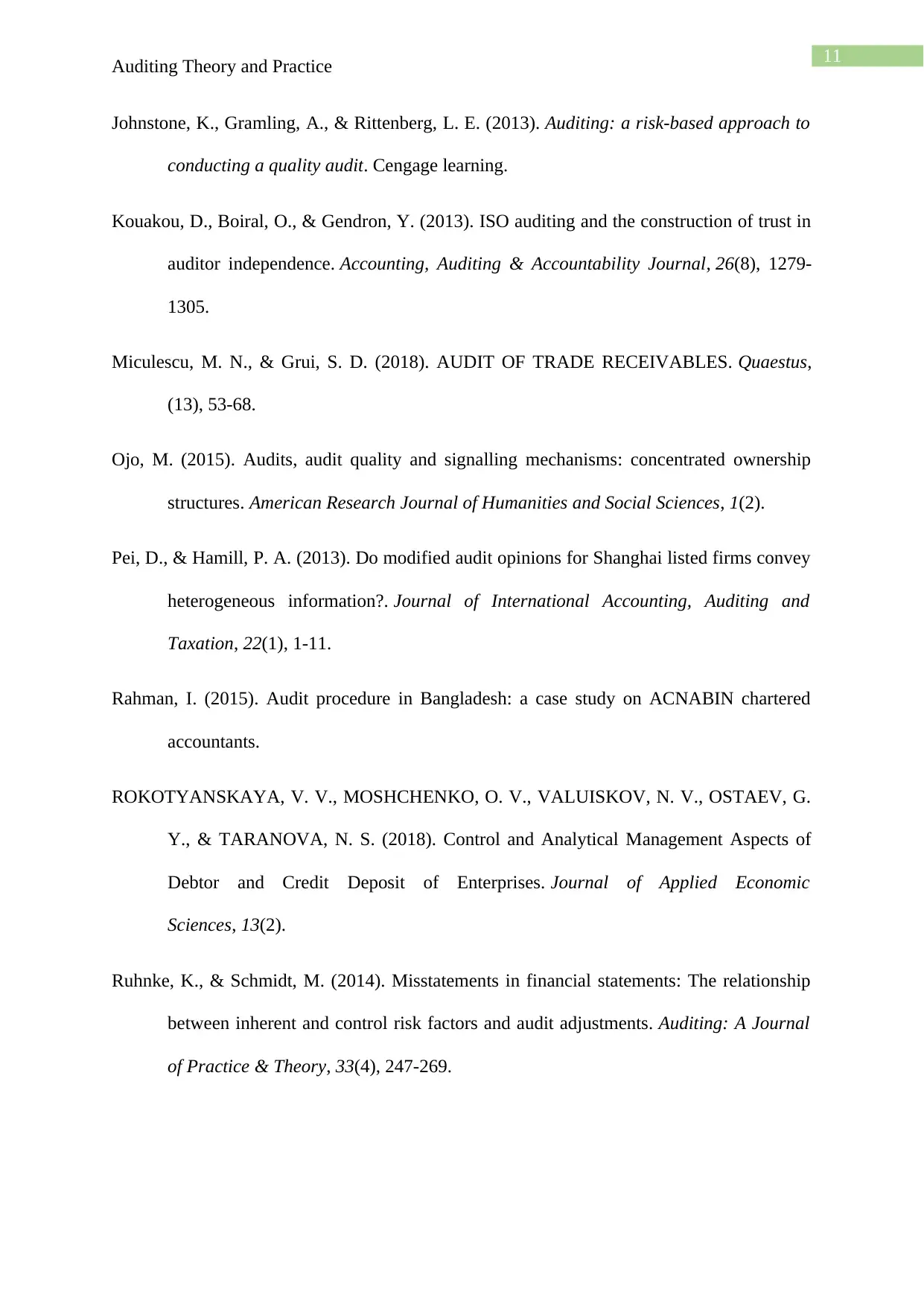
11
Auditing Theory and Practice
Johnstone, K., Gramling, A., & Rittenberg, L. E. (2013). Auditing: a risk-based approach to
conducting a quality audit. Cengage learning.
Kouakou, D., Boiral, O., & Gendron, Y. (2013). ISO auditing and the construction of trust in
auditor independence. Accounting, Auditing & Accountability Journal, 26(8), 1279-
1305.
Miculescu, M. N., & Grui, S. D. (2018). AUDIT OF TRADE RECEIVABLES. Quaestus,
(13), 53-68.
Ojo, M. (2015). Audits, audit quality and signalling mechanisms: concentrated ownership
structures. American Research Journal of Humanities and Social Sciences, 1(2).
Pei, D., & Hamill, P. A. (2013). Do modified audit opinions for Shanghai listed firms convey
heterogeneous information?. Journal of International Accounting, Auditing and
Taxation, 22(1), 1-11.
Rahman, I. (2015). Audit procedure in Bangladesh: a case study on ACNABIN chartered
accountants.
ROKOTYANSKAYA, V. V., MOSHCHENKO, O. V., VALUISKOV, N. V., OSTAEV, G.
Y., & TARANOVA, N. S. (2018). Control and Analytical Management Aspects of
Debtor and Credit Deposit of Enterprises. Journal of Applied Economic
Sciences, 13(2).
Ruhnke, K., & Schmidt, M. (2014). Misstatements in financial statements: The relationship
between inherent and control risk factors and audit adjustments. Auditing: A Journal
of Practice & Theory, 33(4), 247-269.
Auditing Theory and Practice
Johnstone, K., Gramling, A., & Rittenberg, L. E. (2013). Auditing: a risk-based approach to
conducting a quality audit. Cengage learning.
Kouakou, D., Boiral, O., & Gendron, Y. (2013). ISO auditing and the construction of trust in
auditor independence. Accounting, Auditing & Accountability Journal, 26(8), 1279-
1305.
Miculescu, M. N., & Grui, S. D. (2018). AUDIT OF TRADE RECEIVABLES. Quaestus,
(13), 53-68.
Ojo, M. (2015). Audits, audit quality and signalling mechanisms: concentrated ownership
structures. American Research Journal of Humanities and Social Sciences, 1(2).
Pei, D., & Hamill, P. A. (2013). Do modified audit opinions for Shanghai listed firms convey
heterogeneous information?. Journal of International Accounting, Auditing and
Taxation, 22(1), 1-11.
Rahman, I. (2015). Audit procedure in Bangladesh: a case study on ACNABIN chartered
accountants.
ROKOTYANSKAYA, V. V., MOSHCHENKO, O. V., VALUISKOV, N. V., OSTAEV, G.
Y., & TARANOVA, N. S. (2018). Control and Analytical Management Aspects of
Debtor and Credit Deposit of Enterprises. Journal of Applied Economic
Sciences, 13(2).
Ruhnke, K., & Schmidt, M. (2014). Misstatements in financial statements: The relationship
between inherent and control risk factors and audit adjustments. Auditing: A Journal
of Practice & Theory, 33(4), 247-269.
⊘ This is a preview!⊘
Do you want full access?
Subscribe today to unlock all pages.

Trusted by 1+ million students worldwide
1 out of 13
Related Documents
Your All-in-One AI-Powered Toolkit for Academic Success.
+13062052269
info@desklib.com
Available 24*7 on WhatsApp / Email
![[object Object]](/_next/static/media/star-bottom.7253800d.svg)
Unlock your academic potential
Copyright © 2020–2026 A2Z Services. All Rights Reserved. Developed and managed by ZUCOL.





